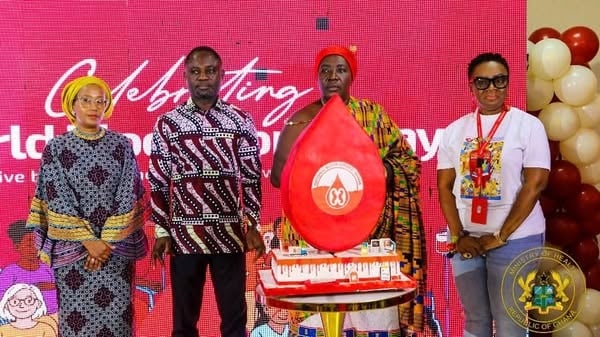Ghana’s National Blood Service (NBS), in partnership with the Ministry of Health and the World Health Organisation (WHO), has commemorated World Blood Donor Day 2025 with a renewed national call to action under the theme: “Give Blood, Give Hope: Together We Save Lives.”
This year’s event paid tribute to the thousands of voluntary, unpaid blood donors whose generosity sustains the country’s healthcare system—and spotlighted the pressing need for more Ghanaians, especially the youth, to embrace regular blood donation as a civic duty.
Delivering the keynote address, Minister for Health Kwabena Mintah Akandoh underscored the centrality of blood safety and availability in the Mahama administration’s “Mahama Cares” healthcare reform programme. In a policy-shifting announcement, he revealed ongoing deliberations to scrap blood processing fees, which have long imposed a financial burden on patients in critical need of transfusions.
“No life should be lost in this country because of a lack of blood,” the Minister stressed, as he urged citizens aged 17 to 60 to make regular blood donation part of their personal contribution to national health. He further challenged both public and private sector organisations to host at least two blood donation exercises each year.
CEO of the National Blood Service, Dr. Shirley Owusu-Ofori, used the platform to spotlight a significant achievement—Ghana collected 187,280 units of blood in 2024, reaching 99% of its national target. She added that over 45,000 units were further processed into components to meet diverse clinical demands.
Despite these gains, Dr. Owusu-Ofori did not shy away from the operational challenges still confronting the Service. She cited major infrastructure constraints, a chronic shortage of mobile blood collection vans, and inadequate investment in a nationwide digital Blood Information Management System as persistent obstacles.
To bridge these gaps, she made a passionate case for establishing Regional Blood Centres and launching a fully resourced National Blood Donor Programme, stressing that these measures are essential for ensuring the long-term resilience of Ghana’s blood supply network.
“As part of this year’s observance, blood donation drives, public education campaigns, and media outreach will take place nationwide to raise awareness and inspire more Ghanaians to become regular donors,” Dr. Owusu-Ofori announced.
In her closing remarks, she issued a heartfelt appeal that captured the spirit of the occasion: “Be a lifesaver. Show off your arm!”—a vivid reminder that every pint of donated blood is a lifeline for someone in need and a step toward a healthier, more compassionate Ghana.


